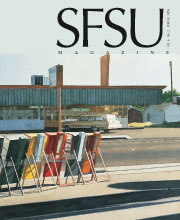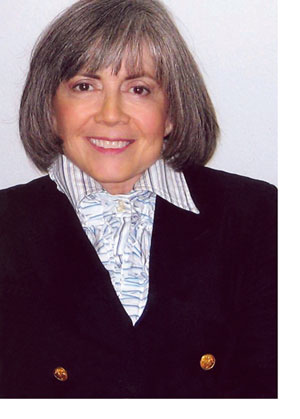 |
| |||
An Interview with Happily settled in her new home in the Southern California desert, the novelist Anne Rice(B.A., '64; M.A., '72) was engaged one morning in her usual routine -- exercise bicycle, coffee, The New York Times -- when her eyes fell on an obituary that gave her a jolt and took her back 40 years to San Francisco State. The Shakespeare scholar Joel Dorius, who taught at SF State for 20 years before retiring in 1984, had died Feb. 16 at age 87. In the mid-1960s, Rice's husband, Stan, studied under Dorius, and he introduced his wife and the professor at a party. The two spoke for only a few minutes, but in that short time, Rice recalls, Dorius gave her a piece of advice that perhaps more than any other helped make her the writer she is today. "I can see him like it was yesterday," Rice says in a phone interview from her home in Rancho Mirage. Dorius' provocative words emboldened Rice -- who longed to succeed as a writer but was tormented by self-doubt -- to surrender herself to the darkness and eroticism that crowded her fertile imagination. "It gave me armor," she says of Dorius' counsel. The vampire tale that was born as a short story of about 28 pages -- written in a single night at her Berkeley home as her husband and toddler daughter, Michelle, slept -- would become the best-selling Rice's 27 novels -- 10 comprising "The Vampire Chronicles" and three chronicling "The Lives of the Mayfair Witches" -- have sold more than 75 million copies, won her worshipful fans, and inspired a hit Hollywood movie. Though she has put the vampire genre behind her, the public's thirst for her blood-lusting characters is not yet slaked. In April, the dark hero of her vampire series hit the Broadway stage in the musical "Lestat," scored by Elton John and Bernie Taupin. At 64, Rice has slowed down hardly at all. This afternoon, she is absorbed in research for the second of a projected four historical novels on the life of Jesus Christ. Her small office is strewn with scholarly volumes on the New Testament, their pages marked with colored stickies. Rice returned to Catholicism in 1998 after many years away from the church in which she was raised, and has since vowed that anything she puts to paper will "have to serve him or it [won't] get written by me." Rice reports that she is much happier since rekindling her faith. The turn from the hellish to the holy surprised fans but her first volume in the new series, "Christ the Lord: Out of Egypt" (Alfred A. Knopf, 2005), nevertheless climbed The New York Times fiction best-seller list. Though biographical fiction is new to her, Rice says she's still writing about the same theme, "how we save ourselves, or how we get saved." While Rice owes her success to her own prodigious talent and hard work, she is effusive in her praise of SF State. "I loved it from the first moment I saw it," she says. Rice arrived on campus with a boundless curiosity about the world, and was delighted by the faculty's enthusiasm for nourishing her budding intellect. Her professors taught her to read literature in the historical and social context of its time. "It wasn't an accident that I would sit down and write about how a supernatural being viewed the ages," she says. Rice meandered among majors before settling on political science for her undergraduate degree. She returned to campus to earn a master's in creative writing. Rice has a pantheon of professorial greats. The Hemingway scholar Robert "Robin" Gajdusek taught Rice about psychological subtext in literature. He introduced her to the work of Virginia Woolf, who would become Rice's literary hero. Richard Wiseman, professor of world and comparative literature, exposed Rice to literary themes that would find their way into her own stories of vampires who roam the world seeking deliverance from despair -- along with life-sustaining blood. "We talked a lot about how 20th century writers confronted the void," she says. "I found his lectures to be transforming." From Herbert Wilner the English professor, Rice learned of the interconnectedness of faith and thought. Other influences were Mark Linenthal, who directed SF State's acclaimed Poetry Center at the time Stan Rice was assistant director, and the visiting professor Edouard Roditi, a French poet and scholar. The past several years have been turbulent for Rice. Her husband, a poet and painter who chaired SF State's Creative Writing Department from 1980 to 1988, died of brain cancer in 2002 in Anne's native New Orleans, where the couple and son Christopher moved after Stan's retirement in 1988. (Daughter Michelle died from leukemia in 1972, at age 5. Christopher, born in 1978, is a novelist who lives in West Hollywood.) In 1998, an overweight Rice fell into a near-fatal diabetic coma. She underwent gastric bypass surgery in 2003 and has since shed more than 100 pounds. Rice had already moved out of her Garden District mansion when Hurricane Katrina struck. She watched the devastation on television from her new home, a seaside villa in La Jolla. After a year on the coast, Rice put her home on the market and fled to the desert, where she enjoys the year-round sun, and the dry air is kinder to her allergies. "This place would have been too peaceful for me 20 or 30 years ago," she says, "but now I just want to write and study and sit on the floor in my room and go through three or four books and write for five hours. To sit here in this little office and be able to look at the sides of the mountains when the sun is going down on the oleanders -- I just love it," she says. As the interview winds down, there is one more thing Rice wants to say."Please give my love to everyone -- Anne Burke is a freelance writer who lives in Los Angeles. | ||||










